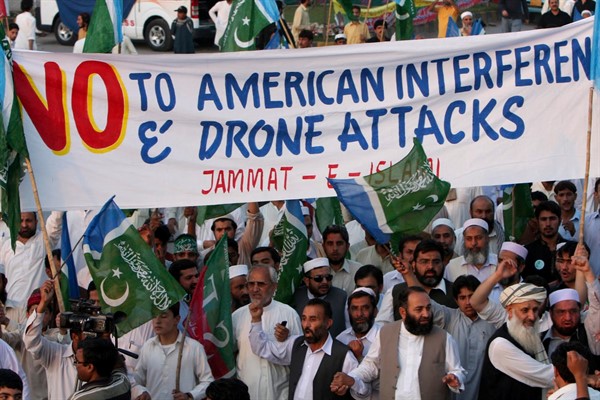On June 30, a coalition of 100 NGOs delivered a concise letter to the office of President Joseph Biden demanding “an end to the unlawful program of lethal strikes outside any recognized battlefield, including through the use of drones.” The letter arrived at an important political and symbolic juncture, just as the withdrawal of U.S. forces from Afghanistan, initially scheduled to coincide with the 20th anniversary of 9/11, was nearing completion. The attacks of 9/11 and the war in Afghanistan that followed kicked off the massive expansion of America’s military footprint abroad, from which the drone program emerged and grew. While it remains to be seen whether the letter will have any impact on the Biden administration’s policy, the fact that it was written and the arguments it expresses represent important new developments in advocacy for an end to what has been euphemistically called America’s “targeted killing” program.
The first thing to note is what the letter does not argue. It does not, as media headlines imply, make the case against the use of weaponized drones. Drones, or remote-controlled aerial weapons platforms, have come under scrutiny for many reasons, but experts in humanitarian law tend to agree they can be used lawfully in combat zones, just as other aerial platforms. Instead of demonizing drones, the letter rather focuses on the unlawful U.S. policy of extrajudicial killing outside war zones, a policy often carried out using drones, but also sometimes by special operations forces, as in the killing of Osama bin Laden. Nor does the letter mention “targeted killing,” which, much like the Bush administration’s depiction of torture as “enhanced interrogation,” is simply a euphemism. Instead, the letter calls such killings what they are: an “unlawful program of lethal strikes outside any recognized battlefield, including through the use of drones.”
The letter’s second important contribution is the way it frames what’s at stake. Even as the letter’s authors narrow the frame from “drones everywhere” to “drones used for targeted killing,” they widen it in politically important ways. Already, anti-drone advocacy has suffered from a liability that scholars of transnational advocacy refer to as “frame soup”—a proliferation of rationales, agendas and asks. The authors of this letter took a major step in using this multiplicity of agendas to their advantage, identifying a wide umbrella frame that would resonate with the cacophony of this diverse coalition, rather than alienate any one group: the need to end the post-9/11 “war-based paradigm.”

